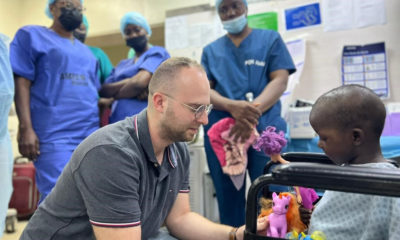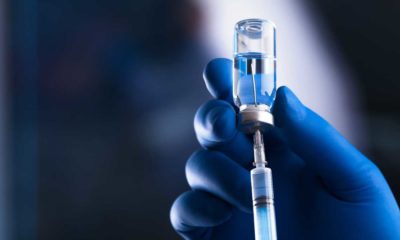
Community
Declining immunity points to need for booster shot
Booster jabs may well become essential as it appears that antibodies to COVID-19 decline significantly six months after receiving a second dose of the Pfizer vaccine.
That’s according to a recent study by the Sheba Medical Center, Israel’s largest hospital, rated by Newsweek as one of the top-10 hospitals in the world for the third year running.
Published in the prestigious New England Journal of Medicine on 7 October 2021, the study was conducted on 5 000 of Sheba’s medical workers comprised of different populations including immunocompromised individuals who were monitored with weekly serological testing.
The findings clearly illustrate a waning response to the vaccine, with neutralising antibodies decreasing sharply in the first three months following the second dose of the vaccine, and significantly abating afterwards.
“This study tends to support the view that durable protection decreases sometime after vaccination, especially after six months,” says Professor Barry Schoub, who chairs the Ministerial Advisory Committee on COVID-19 vaccines.
Schoub, also professor emeritus of virology at the University of the Witwatersrand and the founding director of the National Institute for Communicable Diseases, points out that Sheba’s study and the observations of increasing post-vaccination “breakthroughs” aren’t definitive evidence of waning immunity after six months.
“These observations may be a reflection of the prioritisation of higher-risk individuals, such as the elderly, in the earlier stages of the vaccination programme, as, for example, in Israel. It’s important to note that the precise correlates of immune protection are still being studied and haven’t yet been definitively established. Neutralising antibodies may well be one of these components.
“However, other elements of the immune system certainly also play an important role in immune protection, such as cell-mediated immunity and non-neutralising antibodies, and these are considerably more durable than neutralising antibodies.
“Studies in South Africa and the United States have demonstrated the persistence of these components of the immune response to SARS-CoV-2 well past nine months following vaccination. Nevertheless, as an added precaution in certain vulnerable situations, such as people who are immune-suppressed or are in high-risk exposure situations such as healthcare workers, it may be appropriate to administer a booster dose of vaccine.”
As of 7 October, United States President Joe Biden is one of the about 6.4 million people who have received a booster shot in America, according to an NBC News analysis of Centers for Disease Control and Prevention data.
Meanwhile, England and several European Union member-states have already launched their own booster campaigns, and, from 11 October in Australia, severely immunocompromised individuals could get COVID-19 vaccine boosters.
Interestingly, Israel is believed to be the first country to make a valid vaccination passport conditional on having received a booster shot. On 26 September, it introduced new rules for determining coronavirus vaccination status, making a booster shot a requirement for full inoculation and vaccination passports.
Another Sheba study was one of the main determining factors in Israel’s decision to administer a booster dose of the COVID-19 vaccine. It showed an increase in COVID-19 morbidity as time elapsed from vaccination.
“These study results have great significance, especially for countries that haven’t yet administered a booster dose or for countries where six months have already passed since its citizens received the second dose,” Professor Gili Regev-Yochay, the director of the infectious diseases unit at Sheba, told the media. “We anticipate that these findings will be a significant part of decisions on vaccination protocol in the future.”
Schoub says that the following two issues are still under discussion: when the booster will become available in South Africa; and what other vaccines besides Pfizer will need a booster.
With other research coming out of Israel, the Jerusalem Post has noted, “If COVID-19 doesn‘t make you sick, diet soda might.”
According to Ben-Gurion University scientists, new research has found that certain artificial sweeteners can cause previously healthy gut bacteria to become diseased, leading to discomfort and digestive issues.
Ariel Kushmaro, a researcher from the university, noted that there’s little accurate labelling of artificial sweeteners on products, making it difficult to know how much each product contains.










